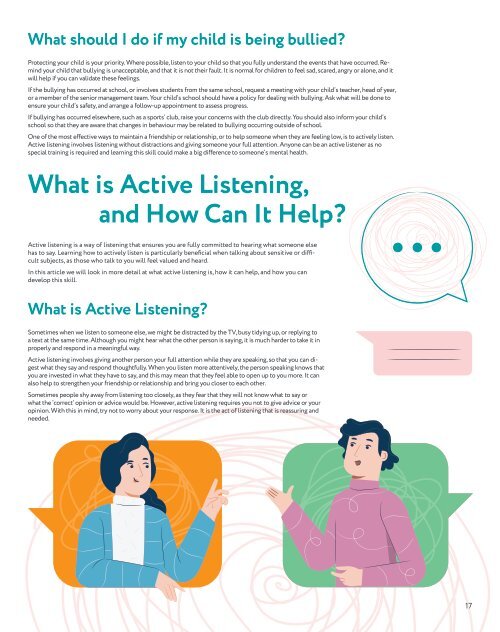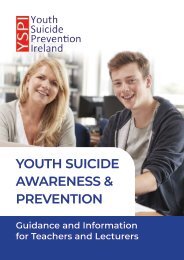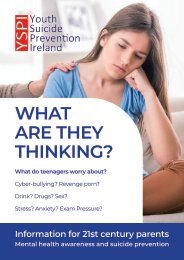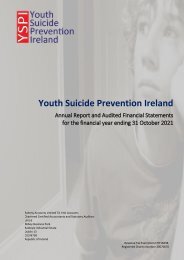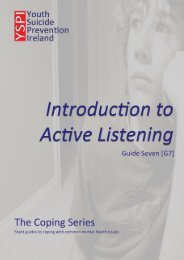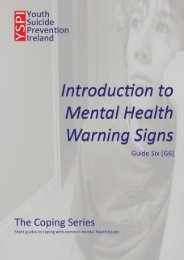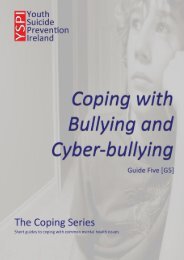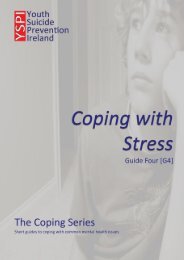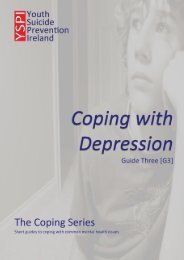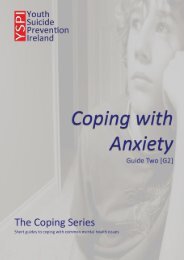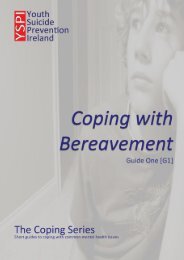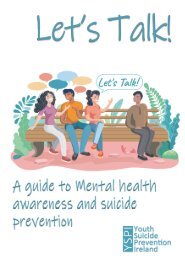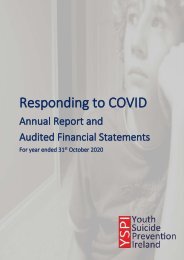Let's Talk About Mental Health
Written by Dr Hannah Farnsworth this magazine provides guidance on common mental health issues with coping strategies and support information. Topics covered include Anxiety, Stress, Depression, Bullying & Cyber-bullying, Warnings Signs of Mental Health Crises and an introduction to Active Listening. This guide is written by a registered medical practitioner and is suitable for ages 16+. Parents are advised to read the guide before letting under 16s have access.
Written by Dr Hannah Farnsworth this magazine provides guidance on common mental health issues with coping strategies and support information. Topics covered include Anxiety, Stress, Depression, Bullying & Cyber-bullying, Warnings Signs of Mental Health Crises and an introduction to Active Listening.
This guide is written by a registered medical practitioner and is suitable for ages 16+. Parents are advised to read the guide before letting under 16s have access.
Create successful ePaper yourself
Turn your PDF publications into a flip-book with our unique Google optimized e-Paper software.
What should I do if my child is being bullied?<br />
Protecting your child is your priority. Where possible, listen to your child so that you fully understand the events that have occurred. Remind<br />
your child that bullying is unacceptable, and that it is not their fault. It is normal for children to feel sad, scared, angry or alone, and it<br />
will help if you can validate these feelings.<br />
If the bullying has occurred at school, or involves students from the same school, request a meeting with your child’s teacher, head of year,<br />
or a member of the senior management team. Your child’s school should have a policy for dealing with bullying. Ask what will be done to<br />
ensure your child’s safety, and arrange a follow-up appointment to assess progress.<br />
If bullying has occurred elsewhere, such as a sports’ club, raise your concerns with the club directly. You should also inform your child’s<br />
school so that they are aware that changes in behaviour may be related to bullying occurring outside of school.<br />
One of the most effective ways to maintain a friendship or relationship, or to help someone when they are feeling low, is to actively listen.<br />
Active listening involves listening without distractions and giving someone your full attention. Anyone can be an active listener as no<br />
special training is required and learning this skill could make a big difference to someone’s mental health.<br />
What is Active Listening,<br />
and How Can It Help?<br />
Active listening is a way of listening that ensures you are fully committed to hearing what someone else<br />
has to say. Learning how to actively listen is particularly beneficial when talking about sensitive or difficult<br />
subjects, as those who talk to you will feel valued and heard.<br />
In this article we will look in more detail at what active listening is, how it can help, and how you can<br />
develop this skill.<br />
What is Active Listening?<br />
Sometimes when we listen to someone else, we might be distracted by the TV, busy tidying up, or replying to<br />
a text at the same time. Although you might hear what the other person is saying, it is much harder to take it in<br />
properly and respond in a meaningful way.<br />
Active listening involves giving another person your full attention while they are speaking, so that you can digest<br />
what they say and respond thoughtfully. When you listen more attentively, the person speaking knows that<br />
you are invested in what they have to say, and this may mean that they feel able to open up to you more. It can<br />
also help to strengthen your friendship or relationship and bring you closer to each other.<br />
Sometimes people shy away from listening too closely, as they fear that they will not know what to say or<br />
what the ‘correct’ opinion or advice would be. However, active listening requires you not to give advice or your<br />
opinion. With this in mind, try not to worry about your response. It is the act of listening that is reassuring and<br />
needed.<br />
17


